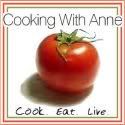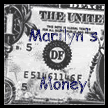Welcome to Flashback Fridays, a new gimmick series I'm starting here. This blog is 3-1/2 years old and there is actually a bit of useful information back in the archives. Every now and then -- on a Friday, obviously -- I'll re-post something I wrote way back when.
This post is from September 13, 2007. It's interesting to read, because some things have changed (although we still don't spend much money on organic foods, we're growing more of our own food now, using organic practices), and some things have stayed the same (we're still spending about $200 a month on food, thanks to some positive changes in the way we eat...and drink).
Another thing that hasn't changed are the links at the bottom. They still work.
There's been a lot of buzz lately on other blogs like this one about eating cheap. The articles run the gamut from cutting a few dollars from the monthly food budget to eating for $15 a week.
Along with the buzz comes a bit of criticism about just what is being eaten on a limited budget, whether it's healthy, whether it's organic, whether it honors fair trade standards.
To all of that I say...whatever.
There are no right or wrong answers. Each person or family has a set of priorities they choose to follow. Some my have to keep their budget to a minimum, trying for simple sustenance for the fewest dollars possible. Others may choose health or political issues as their top priorities.
For my family, the goal is to have tasty, affordable meals that are reasonably healthy. I admit I have no political agenda when it comes to shopping, and frankly, while some organic foods may be healthier, I'm simply not willing to spend the money required for organic food. Some may say I'll pay the price later in medical bills, and that may be so, but on our current budget, I'm not budging.
On average, we spend $200 a month on groceries for Shane, Kat and myself. Keep in mind that when I say groceries, I mean ONLY food for home consumption. I don't include cleaning supplies, paper products, alcohol, pet food or dining out in our grocery budget.
We've been averaging $200 a month, or $50 a week, since 2002. Despite the rising cost of food, our average has stayed the same, so in a sense, we're actually spending less on food than we were five years ago.
The biggest secret, I think, to keeping food costs down, is to learn to cook from scratch. Much money can be saved by making your own bread, biscuits, rice side dishes, cakes, soups, etc. Many cents per pound can be saved by cutting up whole chicken yourself or buying a large cut of beef or pork and cutting it into steaks, chops and roasts yourself.
The second and third secrets to lowering your food costs, in my opinion, are to buy food where it is cheapest and to stop being "brand loyal". Here in the Midwest, we have a chain of stores called Aldi. The are an international company that carries quality, mostly private label foods. My best friend worked for Aldi for many years and confirmed that most of the foods there are processed and packed by the major label food companies. Some are of identical taste and quality; others taste slightly different, but that doesn't mean they are inferior. They have several products, such as their tortilla chips, that we've come to prefer over any brand available. In addition, they have special purchases of brand name items, selling for considerably less than in conventional grocery stores.
I'd estimate that savings at Aldi over conventional supermarkets is approximately 33% across the board. Another similar store in our area is called Sav-A-Lot. I'm sure there are stores such as these all over the country.
Beyond cooking and buying food as inexpensively as possible, the most important thing you can do to save money on food is to plan menus. You'll see this advice time and time again when you visit sites similar to this one. Knowing what you need before you go to the store, and buying only those things WILL save you money by reducing or eliminating impulse purchase and food that is wasted because you didn't end up cooking it after all.
Wonder what kinds of meals we could possibly be eating on such a limited budget? Stay tuned. Recipes, photos and weekly menus are on their way.
Meanwhile, check out these similar articles:
How to Feed Yourself For $15 A Week
Save Over $1440 A Year By Brown Bagging It
Cheap Cooking
$45 Emergency Menu for 4 to 6


















2 comments:
I shop at Aldi's, but not all the time. My usuals are Sam's Club for bulk items, then the Dollar General for certain things. Having 6 people to feed makes our food bill a bit higher than yours... I'm envious.
I wish we had an Aldi's!
I have to say, I have not bought in to the whole "only buy organic" thing. I buy whatever I can get for the best deal. We do buy a lot of produce from a local farm that is organic, but if we need something and don't have time to run to the farm, I buy whatever I can get for the least money.
I shop Kroger, Walgreens, CVS and Dollar general for the most part. But I am not loyal to any of them. This week, our FoodTown has an amazing deal...to me...on chicken breasts, so that is where I am going. And I think that is almost all I need to buy this week.
Post a Comment